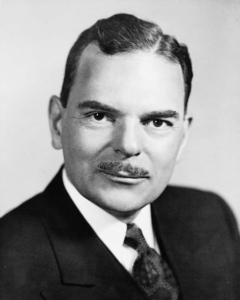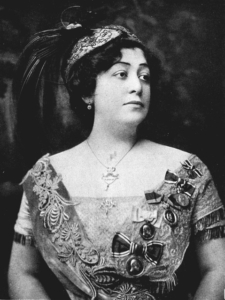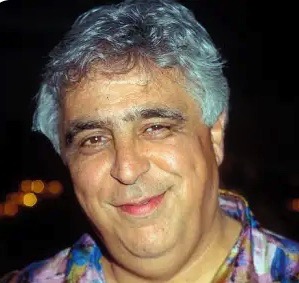REVIEW POTPOURRI: Interesting people
 by Peter Cates
by Peter Cates
Former New York Gov. Thomas Dewey
Former New York Governor Thomas Dewey (1902-1971) has been pretty much tossed in the dumpster of 20th century ancient American history, except for brief mentions as the Republican opponent of FDR – Franklin Delano Roosevelt – in 1944 and of Harry S Truman, in 1948, (the photo of smiling Harry holding the New York Times cover story, Dewey Beats Truman, when that News that’s Fit to Print institution called the race a bit too early, has reappeared zillions of times in history books as a quite telling example of “losers” getting the last laugh).
To Dewey’s credit, his work as a prosecutor during the 1930s smashed the Murder Incorporated crime syndicate and sent its leader Lepke Buchalter to the electric chair in 1944.
Dutch Schultz attempted to murder Dewey in 1935, despite orders not to from the mob leadership, which resulted in his own death soon after by a hit man while using the restroom in a Newark, New Jersey, bar .
Lucky Luciano was successfully prosecuted by Dewey for his prostitution rackets, later commenting how much he detested Dewey for “making him a gangster in the public’s eye.”
As a presidential candidate, Dewey campaigned on a carefully blended mix of “pay as you go liberalism and compassionate liberalism. ” During the 1950s, Dewey exerted powerful influence in the Republican party and his backing of Eisenhower helped much in the 1953 White House victory.
A quite interesting 1975 book, The Best Years 1945-1950, has a chapter, “The GOP: Dewey, Again, ” in which author Joseph C. Goulden casts a not so favorable light on his insufferable arrogance. Dewey divided people into two groups – those “who could help him politically; and the press, servants and lesser public.”
Goulden writes one paragraph that conveys just how despicable Dewey could be:
“Warren Moscow, a political writer for the New York Times who knew Dewey well, said of him, ‘Mr. Dewey is a strange character – or perhaps I might say, he’s a strange lack of character. ‘ According to Moscow, soon after Dewey became governor he received a report about an outbreak of amoebic dysentery at a state mental hospital. One patient had already died. A legislative leader asked Dewey privately what he intended to do. Dewey replied, ‘Oh, we’ll let it slide a bit, let it coast for a little while, and then we’ll make a bigger splurge when we clean it up.’ Seven deaths later Dewey acted, depicting the hospital situation as ‘typical of twenty years of dry rot and incompetence’ of preceding Democratic administrations. ‘In my opinion,’ Moscow said, ‘it boils down to seven people dying so that Mr. Dewey could get his name in bigger headlines.’ “
My first awareness of Thomas Dewey came via a 1960 Look magazine with a photo gallery on its front cover of six famous political leaders – FDR, Truman, Eisenhower, Nelson Rockefeller, then-Massachusetts Senator John Fitzgerald Kennedy and Dewey with his own beaming smile and little black mustache.
Marguerite Matzenauer
Pasquale Amato
Donizetti: La Favorita – “Ah! L’alto armor (Oh, Love)”; Pasquale Amato, baritone, and Marguerite Matzenauer, soprano; Victrola Red Seal 89062, one-sided 12-inch acoustic shellac disc, recorded 1912.
Soprano Matzenauer (1881-1963) was a native of Timisoara, Romania, and sung in a number of Italian and German operas at the Met during the World War I years. She also had a phenomenal memory and learned the very demanding role of Kundry for a production of Wagner’s opera Parsifal on short notice.
Italian baritone Amato (1878-1942) appeared at Milan’s La Scala in 1907 in several successful productions conducted by Arturo Toscanini and followed the Maestro to the Met when the latter became Music Director in 1908, Amato remaining there until 1921. During the mid-’30s, he landed a job teaching voice at Louisiana State University.
Both singers left a sizable number of recordings. Their 1912 collaboration in a love duet from Donizetti’s richly melodic opera La Favorita, despite the acoustic sound, is one very exquisite example of blended vocalism with each doing solo turns. This performance can be heard via YouTube and, for connoisseurs of fine operatic singing, is most highly recommended.
John Capodice
During season 8 of the series CSI, accessible without commercials on Hulu, character actor John Capodice (1941-2024) did a skilled performance in a recurring role as a Las Vegas mobster Gedda who has several police officers, prosecutors and judges on his payroll. Just the manner in which Gedda eyeballs different individuals with undesirable attention is something to watch.
.
Responsible journalism is hard work!
It is also expensive!
If you enjoy reading The Town Line and the good news we bring you each week, would you consider a donation to help us continue the work we’re doing?
The Town Line is a 501(c)(3) nonprofit private foundation, and all donations are tax deductible under the Internal Revenue Service code.
To help, please visit our online donation page or mail a check payable to The Town Line, PO Box 89, South China, ME 04358. Your contribution is appreciated!





Leave a Reply
Want to join the discussion?Feel free to contribute!